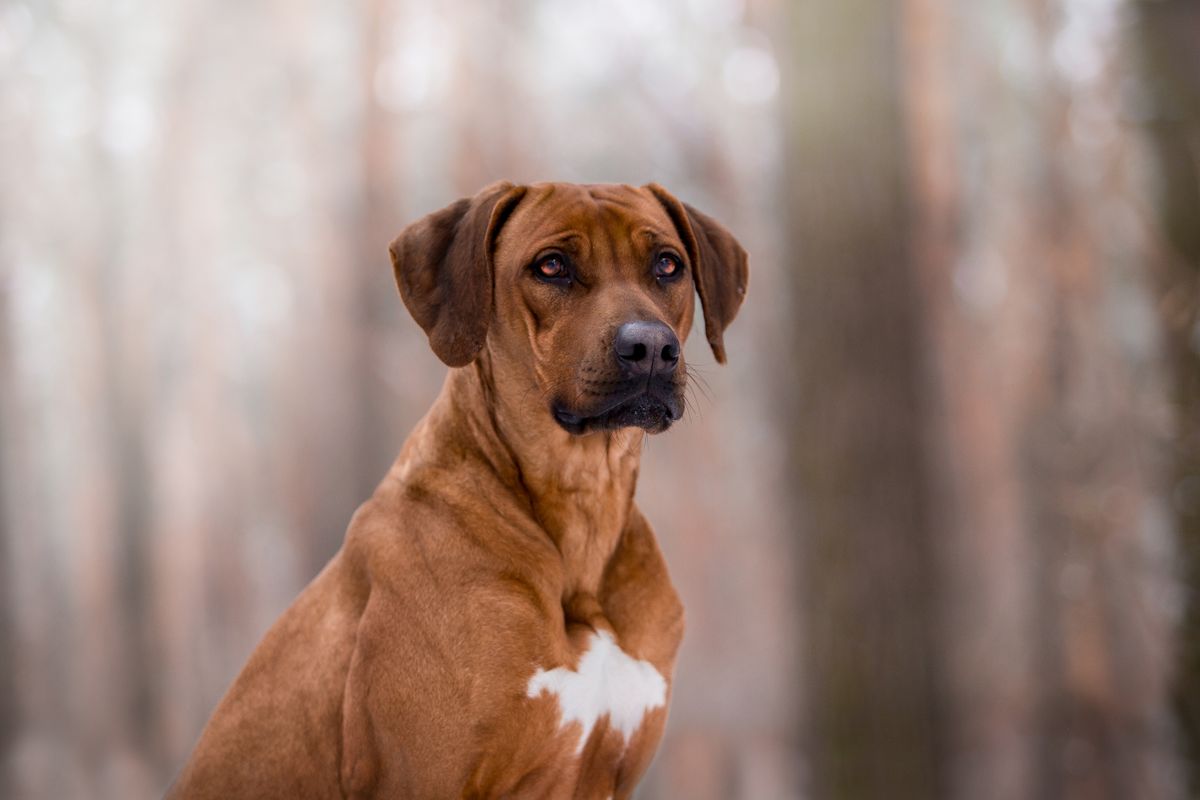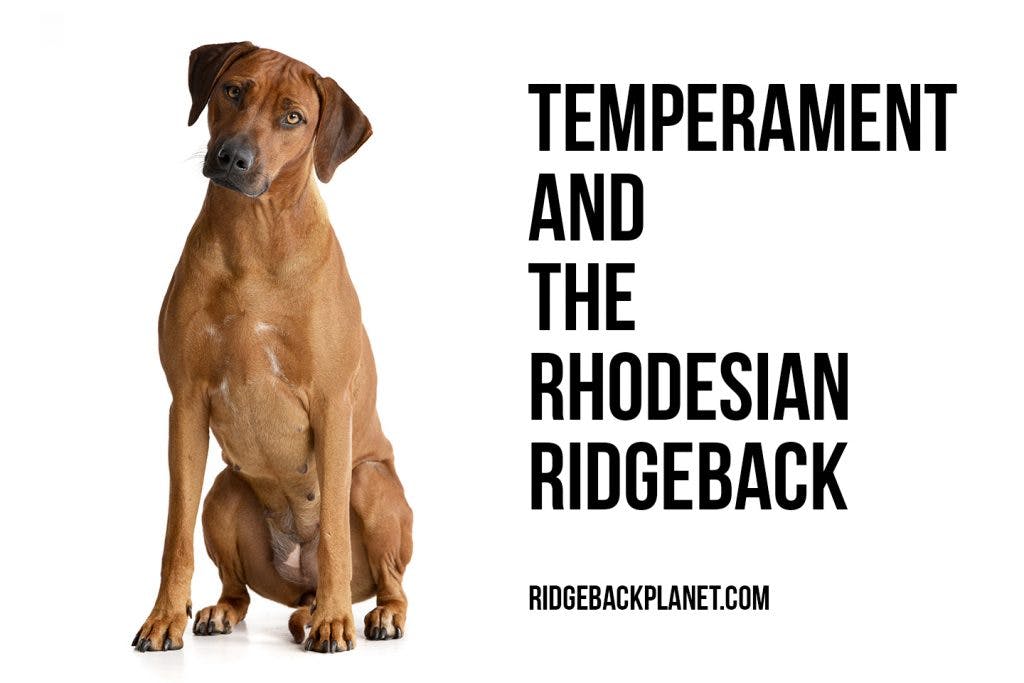Understanding the Temperament of the Rhodesian Ridgeback

When searching for the perfect dog breed for yourself and your family, it is highly likely that you were first attracted to the Rhodesian Ridgeback for its exceptional good looks. However, looks are not the only thing you should be choosing a potential family member based on, and certainly not the most important.

Temperament, as it relates to the Rhodesian Ridgeback, is the general attitude of the breed towards people and other animals. Or as the dictionary states ‘a person’s, or animal’s nature, especially as it permanently affects their behavior. In other words, put simply, it is the core of your Rhodesian Ridgebacks being, its personality!
When searching for the perfect dog breed for yourself and your family, it is highly likely that you were first attracted to the Rhodesian Ridgeback for its exceptional good looks. However, looks are not the only thing you should be choosing a potential family member based on, and certainly not the most important.
Rather, you should be looking closer at the personality of the Rhodesian Ridgeback, or as it is more technically known the temperament. This is because, when it comes to choosing a dog breed temperament does matter, in fact, it matters very much!
Why Is Temperament Important?
Every single year there are thousands of people who are victims of dog bites. And to be clear these are not just nips, but severe and potentially damaging bites. Dog attacks have become a significant problem in our society, and one that needs addressing!
Recently, the ‘deed not breed’ campaign has highlighted that aggression in dogs is not specific to certain breeds. Rather, it is a product of a dog’s poor temperament. Where once we believed, for example, that all Pit Bulls were aggressive and potentially dangerous, we now know this not to be the case.
A recent study undertaken shows that many breeds you may not even consider to potentially be of a bad temperament are in fact responsible for the most dog bites in the USA. These include:
- Chihuahua
- Jack Russell Terrier
- Cocker Spaniel
- Bulldog
- Australian Shepherd
- German Shepherd
- Lhasa Apso
This is not to say, or to send you into a blind panic, that the Rhodesian Ridgeback or others are all vicious breeds that will potentially attack you, your, family, or friends. It is simply more a way to warn you of the dangers of not taking them, or any dog breeds for that matter, temperament seriously.
Whilst clearly, aggression and the potential to attack have to be the top reasons that temperament is important, there are others too. A clash of personalities, for example, is another factor to take into consideration when picking a dog breed. After all, you wouldn’t pick active and energetic personalities to have as friends if you were basically laid back and lazy.
How Is Temperament Decided?
Whether the dog in question is a Rhodesian Ridgeback or any other breed, there are three factors involved in deciding their temperament. These are:
- Genes
- Socialization
- Training
All three of these factors fall under two categories which have been hotly debated for many, many years, and will probably continue to be so for many years more. This is the age-old debate of nature versus nurture; what we inherit and what we are taught! Whilst no one denies that both factors contribute to temperament, how much so each one does is very much still up for discussion.
The truth is that neither of the positions of this argument, ‘all nature or all nurture’, are particularly tenable as there are just too many ‘facts’ on both sides which are inconsistent with an all-or-nothing view. Rather, we must accept that both sides are responsible for the temperament of our dogs.
What Are The Genetics Of Temperament?
It is undeniable that certain aspects of temperament, or tendencies to behave in a certain way, to put it simpler, are inherited. This, however, does not mean that a puppy simply gets these mannerisms from their parents or even grandparents for that matter. Rather, they are inherited from the breed in general and are a set of behaviors that most dogs of that breed will display.
As examples, genetically inherited temperament is why Border Collies herd, Retrievers retrieve, and Rhodesian Ridgebacks hunt. It would also be why if a potential dog owner said ‘I want a dog that is good with children and will guard my house’ anyone who knows the Rhodesian Ridgeback would suggest one. Rhodesian Ridgebacks, you see, will perform these dual duties because it’s in their genes.
Using the term ‘most dogs’, as we earlier did, is important as not every single dog of a certain breed will display inherent traits. For example, there are Labrador Retrievers out there who will not retrieve, even a simple ball, and will not put a paw to water.
How Does Socialization Or Lack Of Affect Temperament?
Socialization is one of the two factors which decide temperament that relies upon nurture rather than nature. It is where we expose our dogs to as many sights, sounds, environments, and experiences as we can. Why? Well, because it allows your Rhodesian Ridgeback to feel safe around pretty much anything, and not behave in a frightened and possibly aggressive manner.
In general, dogs only behave aggressively, perhaps attacking, because of things, events, situations, and people that they find alien or consider unsafe. Socialization stops this fear and helps them accept, be OK with, and in most cases enjoy whatever experience they are being exposed to.
How Does Training Affect Temperament?
The truth is training doesn’t really affect temperament anywhere near as much as socialization does. Rather, it teaches your Rhodesian Ridgeback what is acceptable behavior, what is not, and how to curb their natural behavioral instinct in response to certain situations.
For example, a Rhodesian Ridgebacks genetic temperament may instinctively tell it to chase small prey that it may encounter when out and about with you. However, if you have trained it not to does so, it won’t. This does not mean that your Rhodesian Ridgeback’s basic temperament has been changed, but rather that you have taught it how to behave appropriately to the experience.
It needs to be noted at this point that not all dogs are created equal when it comes to their ability to be trained. Some breeds, like the Rhodesian Ridgeback, take far more training than others. This is due to their genetic temperament being not the most responsive to being told what to do.
So what Is The Rhodesian Ridgebacks Temperament Like?
The American Kennel Club simply says of the Rhodesian Ridgeback that they are ‘dignified, even tempered, and reserved with strangers’, which is quite a good description but certainly only half the story! The Rhodesian Ridgeback temperament is far more complicated than this and needs to be stated in full. This is not for any bad reasons per se, but rather, a potential owner should know in full what they will be getting. The Rhodesian Ridgeback is:
- Loyal
- Affectionate
- Intelligent
- Territorial
- Confident
- Domineering
- Gentle
- Prey driven
Loyalty – Stemming from their hunting days where they were relied upon to protect not only livestock and land but also their owners, loyalty is number one in Rhodesian Ridgeback temperament. This can mean they will attach themselves more to one member of the family, favoring them above the rest. However, in general, they are an all-round loyal family dog.
Affection – If you will allow them to be Rhodesian Ridgebacks are just one huge bundle of a lap dog that will enjoy nothing more than curling up in your lap. This, probably, is a trait that has become genetic over their time as family members rather than hunting dogs.
Intelligence – It’s difficult to really know whether the Rhodesian Ridgebacks intelligence is a blessing or a curse! After all, it means that they can, if they choose to, pick up training and tricks very quickly, but also that they can cleverly get up to mischief in the blink of an eye.
Territorial – Undoubtedly a part of Rhodesian Ridgeback temperament that stems back to their hunting days in Rhodesia, being territorial is high on this breeds agenda. They are not, however, just territorial over what they see as their domain, but rather people too. This can make them aloof with those that they do not know and protective of those they do.
Confidence – Where the Rhodesian Ridgeback confidence comes from is unknown, but it is certainly a part of their temperament that would have made them an excellent choice of a breed to face off with lions. It makes for a breed that is brave, can be socialized well, and always ready to explore.
Dominance – The Rhodesian Ridgeback has a dominant streak that will, if you let it, lead to this breed being the boss of you. They need an equally strong, if not stronger human personality to keep this part of their temperament in check.
Gentle – As large as they are and as rambunctious as they can be the Rhodesian Ridgeback also has a predominantly gentle temperament with those around them. This makes them ideal companions for children and adults alike.
Prey Driven – As a hunting dog, the Rhodesian Ridgeback has a very strong prey drive for small animals. As previously stated, this is not a part of their temperament that will be easy to control, you may have to keep them on a leash in certain situations.
Does The Temperament Of A Rhodesian Ridgeback Show From Birth Or Develop?
The basic temperament of a Rhodesian Ridgeback, or any breed for that matter, will be evident from the time they begin to interact with other members of their litter and parents. However, as nurture dictates by its very nature, some of the temperament will be still to develop through learning. You, to put it plainly, as a potential owner have the ability to mold and shape any existing temperament.
It should also be stated at this point that if you do not feel that you have the time to put into helping your Rhodesian Ridgebacks temperament develop that you should think twice about giving one a home. Temperament can develop in the wrong direction if not helped by training and socialization given by a Rhodesian Ridgeback owner.
How Can I Tell The Basic Temperament Of A Rhodesian Ridgeback Puppy?
It is not always easy to judge what the temperament of a potential puppy is, especially since you will be meeting them for the first time in a setting that is not exactly conducive to performing tests. However, this should not stop you from observing how a puppy behaves, or for that matter, how their breeder behaves with them as well.
Breeder behavior with puppies and the parents will indicate the kind of nurture they are receiving and are likely to develop temperament from. For example, shouting at the puppies or parents to get them to behave is a bad indication that you may be about to take home a potentially fearful, hence later aggressive pup.
Kind and caring breeders, on the other hand, who clearly love their dogs and their offspring are far more likely to have bred well-balanced puppies that will develop great temperaments as you nurture them more. Good indications of a well-balanced temperament developing include:
- Not being afraid of you or reacting aggressively to your arrival.
- Approaching you and exploring you of their own free will.
- A happy acceptance of being touched not only by their siblings, parents, and breeder but also by you.
- Being comfortable in a strange place such as on your knee or in your arms out of view of the people they already know.
- Not becoming aggressive if their food, treat, or toy is removed from them.
- Not being aggressive to any dog you may already have that they might be about to share their new home with.
It should be noted at this point that fulfilling the above points can only give a hint of good temperament developing. They are certainly not a reliable predictor of a puppies future personality.
How Do I Develop Good Temperament In My Rhodesian Ridgeback?
As previously stated to ensure your Rhodesian Ridgeback develops a good temperament, they need to be subjected to socialization and at the least basic training. These should both be done at as early an age as possible to have the best chance of succeeding and ease of teaching.
At this point, it would be a good time to point out that whilst the genetic temperament of a Rhodesian Ridgeback is out of our control, it is our and ours alone, as owners, responsibility to ensure that it develops in the right direction.
It is, after all, no secret that most dog breeds, whether Rhodesian Ridgebacks or not, that develop temperament issues are the result of a lack of training and socialization. It is, never the dog’s fault, but rather the neglectful owner!
Socialization To Create Good Temperament
From the moment you bring your new Rhodesian Ridgeback puppy home, you should be scheduling regular outings to take them on. This could be to the dentist, a local dog park, vets, your friends, and even local shops, where allowed. Anything and everything they could ever be exposed to in their day to day lives needs to be included.
The reasoning behind this socialization and at an early age is simple. Firstly puppies are pliable and form generalizations such as that something is safe or normal far more easily than older dogs do. And secondly, that you want to be able to take your Rhodesian Ridgeback anywhere and expose them to anything without them becoming fearful, stressed, and potentially aggressive.
Do not forget to socialize your Rhodesian Ridgeback with other dogs at places such as the dog park and training classes. After all, just because you may not have another animal at home does not mean that they will never come into contact with one. In fact, if you go to parks on a regular basis, meeting other dogs is a certainty.
When allowing your Rhodesian Ridgeback puppy to play with other dogs for socialization purpose, do not allow your dog to bully others or vice versa. Bring all negative interactions to an end quickly. This is because dogs that are bullied as puppies tend to become defensive and later themselves aggressive with other dogs.
Tips For Socialization
The following are just a few suggestions of things you can do to socialize your Rhodesian Ridgeback:
- Get friends to come round wearing glasses and hats so they will not react badly to people they meet wearing them.
- Play sounds to your puppy such as fireworks, doorbells, cars beeping, phones ringing etcetera to get them used to as many noises as you can at an early age.
- Get friends to run past yourself and your Rhodesian Ridgeback puppy in the park. You’re bound to come across a jogger at some point
- Ask friends to bring their children round to interact with your puppy. Keep a careful eye on these interactions at all times.
- Let your Rhodesian Ridgeback puppy meet as many strangers as possible. This is especially important for this breed with their tendency to be aloof towards them.
Training To Create Good Temperament
As previously stated training is never going to change a Rhodesian Ridgebacks temperament, but it will curb those less than desirable traits, or in other words, teach them some manners! Again, like socialization, training should start as soon as you get your Rhodesian Ridgeback puppy home.
The first rule of training when it comes to your Rhodesian Ridgeback has to be don’t allow them to get away with anything as a puppy that you don’t want them to be doing at a nigh on 80lb weight. This includes barking, growling, jumping, and nipping which at puppy size seem all so cute, but on reaching adulthood are far from it. Teach them early these behaviors are not acceptable and do not deviate from this path.
Secondly, you will need to accept that the Rhodesian Ridgebacks temperament does not equate to accepting harsh reactions to their unwanted behavior. Rather, they need firm but fair handling with rewards being given for good behavior and bad behavior being redirected.
Redirection would include, for example, if your Rhodesian Ridgeback grabs a wrong item to chew, you replacing it with something that is appropriate and OK to play with.
It is also worth noting at this point that Rhodesian Ridgebacks are not one of the easiest dog breeds to train due to their temperaments. Stubbornness, dominance and their independence levels will cause them to resist. However, perseverance and firmness should deal with these issues and soon have you left with a well trained Rhodesian Ridgeback.
Tips For Training
The following are just a few suggestions of things you can do to train your Rhodesian Ridgeback:
- Use time outs sending your Rhodesian Ridgeback to a quiet spot. Do not, however, use their crate or bed for this as they will think that they are places to go when they have misbehaved rather than to rest or have a quiet time.
- Do not fall for the Rhodesian Ridgebacks tendency to use their big brown eyes to make you give in to their every whim. This is their intelligence shining and once you fall for it, they will use it every chance they get.
- Start training with the basic behaviors you need to instill such as safety commands like sit, stay, heel, lie down.
- Follow on training to behaviors that are desirable such as staying away from the dining table, not jumping up, and going to their bed on command.
- Schedule regular training sessions at times when your Rhodesian Ridgeback puppy is not sleepy or full of playful energy. You want your puppies full attention and the mentioned times are not when you will get it.
- Do not give your Rhodesian Ridgeback any form of guard training. This will only exacerbate their natural guarding instincts and may cause them to become aggressive.
Can You Test A Rhodesian Ridgebacks Temperament?
Temperament tests are frequently used by organizations such as rescue centers to check how their dogs will behave in certain situations before offering them up for re-homing. They are generally performed by behavioral specialists who have the training and vast knowledge of what they are looking for regarding temperament.
To give you an idea of what temperament tests involve they are usually conducted in five parts which are:
- Behavior towards strangers
- Response to auditory stimuli
- Response to a visual stimulus
- Response to tactile stimuli
- Protective and aggressive behavior evaluation
Whilst all the above tests could be performed by any Rhodesian Ridgeback owner at home, it would be irresponsible to suggest that you do so. After all, putting your dog into potentially stressful situations without any real knowledge on their responses or whether they need it at all could be not only dangerous for your dog but also all those involved in conducting them.
Should you think your Rhodesian Ridgeback needs a temperament test, you should contact a dog behavior specialist who will be more than happy to visit you in your home and assess your dog safely and securely.
Signs your Rhodesian Ridgeback may need help with its temperament would include:
- Showing aggression
- Showing fear aggression
- Trying to or actually biting
Please note that behavior such as the aforementioned is very rare in Rhodesian Ridgebacks, especially if they have been socialized and trained correctly.
So, Overall, Does The Rhodesian Ridgeback Have A Good Temperament?
There is absolutely no doubting, that overall, the Rhodesian Ridgeback has an absolutely wonderful natural temperament. They are loyal, loving, intelligent, protective, playful, fun, and just a delight to have around.
Yes, the Rhodesian Ridgeback may require some guidance to bring out the best traits in them, but let’s be honest, what dog breed doesn’t? Show me any dog owner that hasn’t had to train their dog, and I’ll show you a liar! All dogs need some guidance to fulfill their natural potential.
Of course, it doesn’t hurt that the Rhodesian Ridgeback, as well as being perfect in temperament, is also one of the most handsome breeds around. With their big brown eyes, a coat of gorgeous wheaten, and athletic stance, they are quite a good looking breed. They are also, for the large breed lover, a huge handful of a hound to throw your arms around.



